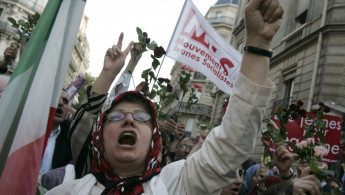Iranian exiled oppositions uncertain about future activities in Europe
Hundreds of thousands of the People's Mujahideen Organisation of Iran (PMOI) supporters took to the streets and encountered the armed members of the Islamic Revolutionary Guard Corps on 20 June 1981 to defend Iran's only freely-elected post-revolution president Seyyed Abolhassan Banisadr.
On that day, known as the beginning of the PMOI entrance military encounter with the Islamists in power, thousands of ordinary people and supporters of other revolutionary organisations joined the PMOI to protect the achievements of Iran's young revolution.
That day's protest led to the arrest of thousands of PMOI supporters and cadres, who the Islamist supporters of Ayatollah Rouhollah Khomeini later executed.
Forty-two years later, on 20 June 2023, the same organisation's last remaining supporters and caders were attacked. This most recent episode of the opposition organisation did not happen in their homeland, nor was any armed force from Iran behind it. The police raided the PMOI Ashraf camp in Europe, in the Albanian city of Maneza.
The videos posted on social media showed the police using pepper spray in the raid, and reports from the PMOI said that one of their veteran caders Ali Mostashari, known by his nom de guerre, Afshin, was killed during the raid.
The PMOI political arm, the Paris-based National Council of Resistance of Iran (NCRI), was quick to slam the raid in a statement calling it cooperation between the establishment in Iran and the Albanian authorities.
"Upon the request of the religious fascism ruling Iran, around 1,000 Albanian police officers attacked Ashraf in a criminal and oppressive act. Many doors, cabinets, and belongings were broken, and residents were attacked with tear gas and pepper spray," read the statement.
The NCRI also demanded the rights groups, European Union, and the international community respond to and condemn the raid.
However, only a few welcomed the PMOI's request. Even the US, one of the organisation's supporters in recent years, tried to distance itself from this opposition group.
"We support the Government of Albania's right to investigate any potential illegal activities within its territory," a State Department spokesperson said in a comment to Fox News Digital.
This remark completely contrasted with Washington's previous full backing of the opposition organisation, which once had a vast support base inside Iran.
In 2013, when the Iraqi military conducted similar raids on PMOI camps in Iraq, Robert Menendez, the US Senate Foreign Relations Committee Chairman, called the attacks "deplorable" and demanded "swift condemnation".
During the past decade, high-ranking US politicians such as Mike Pompeo, former US secretary of state, participated in PMOI's annual rallies, hailing the organisation as a vital force for making change in Iran.
But this year, even France, in a surprise move, rejected the exiled organisation's request for their annual rally in July over the risk of an attack. However, PMOI denied France's reason and accused them of accepting Iran's demands.
"Banning the 1 July rally is a disgraceful deal [between Iran and France] against democracy, freedom of speech, and freedom of assembly. This move manifests the surrender to the extortion and hostage-taking campaigns carried out by the religious fascism that rules Iran," read a PMOI statement.
The establishment in Iran warmly welcomed the Albanian police raid and the ban imposed by the French police, and the outlets close to the Islamic Revolutionary Guard Corps (IRGC) suggested that the pressures on the opposition group were the outcome of a deal between Iran and Western power.
Abdul Reza Farajirad, Iran's former ambassador to Norway and Hungary, confirmed that during the negotiations to release French, Danish and Iranian-Austrain prisoners in Iran, agreements were made about controlling the PMOI activities in Europe.
"Europe does not want to fall behind if the US and Iran finalise a pact. So, they want to prepare the scene for collaborations for when Iran and the US reach an agreement," he said.
Kayhan Daily, whose editor-in-chief is directly appointed by Iran's supreme leader, also hinted that the political changes restraining the Iranian opposition group in Europe resulted from pressures from the establishment and the ultra-conservative President Ebrahim Raisi.
"A shift in strategies and the diplomacy that the current Iranian government deployed have resulted in the change of attitude by some European countries with a long history of animosity with the sacred establishment of the Islamic Republic. [Now] they have understood the power of the Islamic Republic," wrote the Daily.





 Follow the Middle East's top stories in English at The New Arab on Google News
Follow the Middle East's top stories in English at The New Arab on Google News


